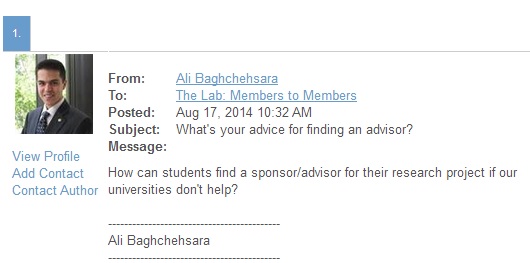If my memory of graduate school serves me  well, first-year graduate students are currently in the process of rotating through research laboratories with hopes of finding the perfect home, a lab where they will spend countless hours conducting experiments and forming professional relationships. The stakes are high. They’ll have to consider what type of research they would like to do and who their advisor will be.
well, first-year graduate students are currently in the process of rotating through research laboratories with hopes of finding the perfect home, a lab where they will spend countless hours conducting experiments and forming professional relationships. The stakes are high. They’ll have to consider what type of research they would like to do and who their advisor will be.
Their advisor will task them with a research project that will greatly influence their career trajectory and shape their personal and professional life for years to come. So, how should these students go about making this critical decision?
Considering that only 57% of individuals entering graduate school will complete their degrees and fewer will secure an academic position, students should be aware of the factors that contribute to their success. You might assume that the graduate advisor plays an important role, and you'd be correct. In a 2013 Cell article about selecting a graduate advisor, Ben Barres states, “Good mentorship is not only pivotal for career success, but it is pivotal for driving innovation and for the health of our universities.” He goes on to provide advice on how to pick a graduate advisor.
"One of the most important tasks of an advisor is to help his or her student to formulate a good and tractable question and then to gently guide a student to formulate good experiments to address this question while encouraging the student to be increasingly independent over time," Barres writes.
There is a general consensus that choosing a good mentor is critical to graduate student performance and that extends to the postdoctoral experience. In a recent American Scientist column, Rachel Levy explains that postdocs seeking academic careers appear to benefit professionally from well-designed professional development and structured oversight. One of the primary factors students should consider in choosing an advisor is the quality of mentorship they will receive. But, is there more to that decision?
In Sigma Xi’s member communities, Ali Baghchehsara, a student member from Iran, asked for advice from his fellow Sigma Xi members on finding an advisor.

Sigma Xi members recommended these steps:
-
Determine what you would like to research.
Start your search by identifying the field of your discipline that is most interesting to you, then read the scientific literature to learn who is already working in that area.
“Try to narrow your field of interests within the discipline by remembering what papers, what lectures, what projects made you interested enough to apply to grad school in the first place. Find out who in the world is publishing in these areas in the last five to 10 years,” wrote John Smith of East Stroudsburg University of Pennsylvania.
Another way to find potential advisors is to become an active student member in the association for your field, suggested Ronald G. Shapiro, a speaker and consultant who works in career development.
-
Contact potential advisors and get to know them.
Don’t be shy. It’s up to you to get in touch with the person who you may want as an advisor and start building a relationship.
“Get to know professors by talking to them after talks or during department social events or even by taking a class they teach,” said another Sigma Xi member.
David A. Boothman of the University of Texas Southwestern Medical Center at Dallas advises rotating through at least three labs before joining one.
“Science is a people game, like everything else,” wrote Smith. “It requires interaction with a professor.”
-
Talk to people who are already in the lab.
Visit the potential advisor’s lab and pay close attention to how the graduate students who are already there act, even down to their body language, said Rajesh Ramakrishnan of Baylor College of Medicine.
“Most of all, understand [this] group of people will be your surrogate family for the time you are in the lab,” he wrote.
Philip K. Stoddard of Florida International University suggests taking the lab members out for a drink off campus, without the potential advisor, to get a sense of how they truly feel about their choice.
“If they start telling funny stories about their advisor, that’s a good sign; war stories are a bad sign,” Stoddard wrote.
-
Ask to join the lab.
If everything goes well up to this point, ask the advisor if space, and funding, exists for you to join the lab.
“Once you find a professor you’ve hit it off with, let them know you’re potentially interested in joining their lab,” wrote one Sigma Xi member. “Be sure to ask what their funding situation is and to find out what projects they might have in mind for a new lab member.”
What are your thoughts? Is mentorship the most important factor in choosing a graduate advisor?
Active Sigma Xi members, to join the conversation in the Sigma Xi membership communities, go to: http://community.sigmaxi.org/home or add to this particular discussion thread.
Additional reading:
http://www.phdcompletion.org/resources/CGSNSF2008_Sowell.pdf
https://hst.mit.edu/sites/default/files/Barres%20BA.Neuron.80.275.2013.pdf
http://www.americanscientist.org/issues/pub/2014/6/postdoc-mentorship-can-launch-careers/99999
Heather Thorstensen contributed to this post.
Image: VIC CVUT/ Wikimedia Commons / CC-BY-SA-3.0